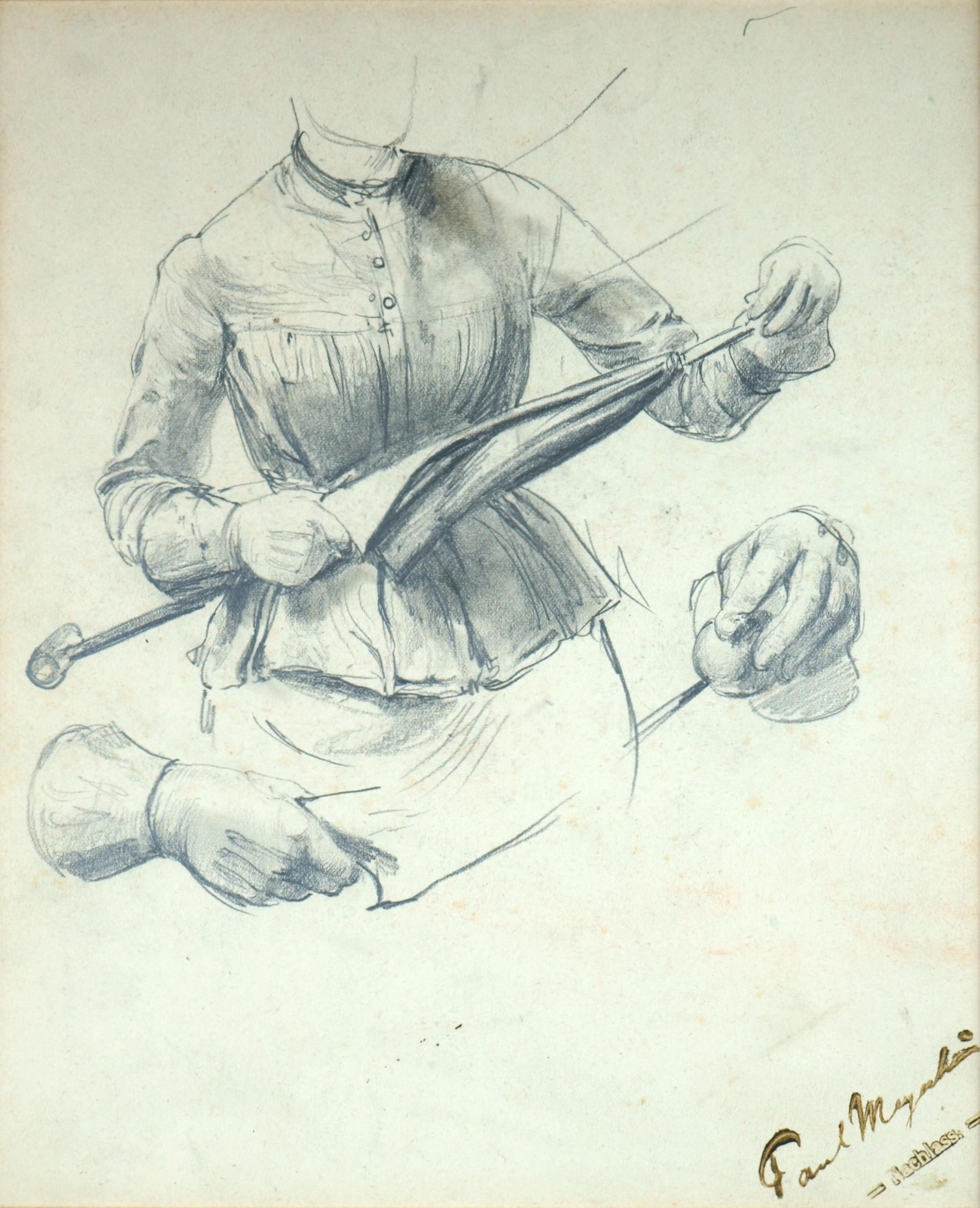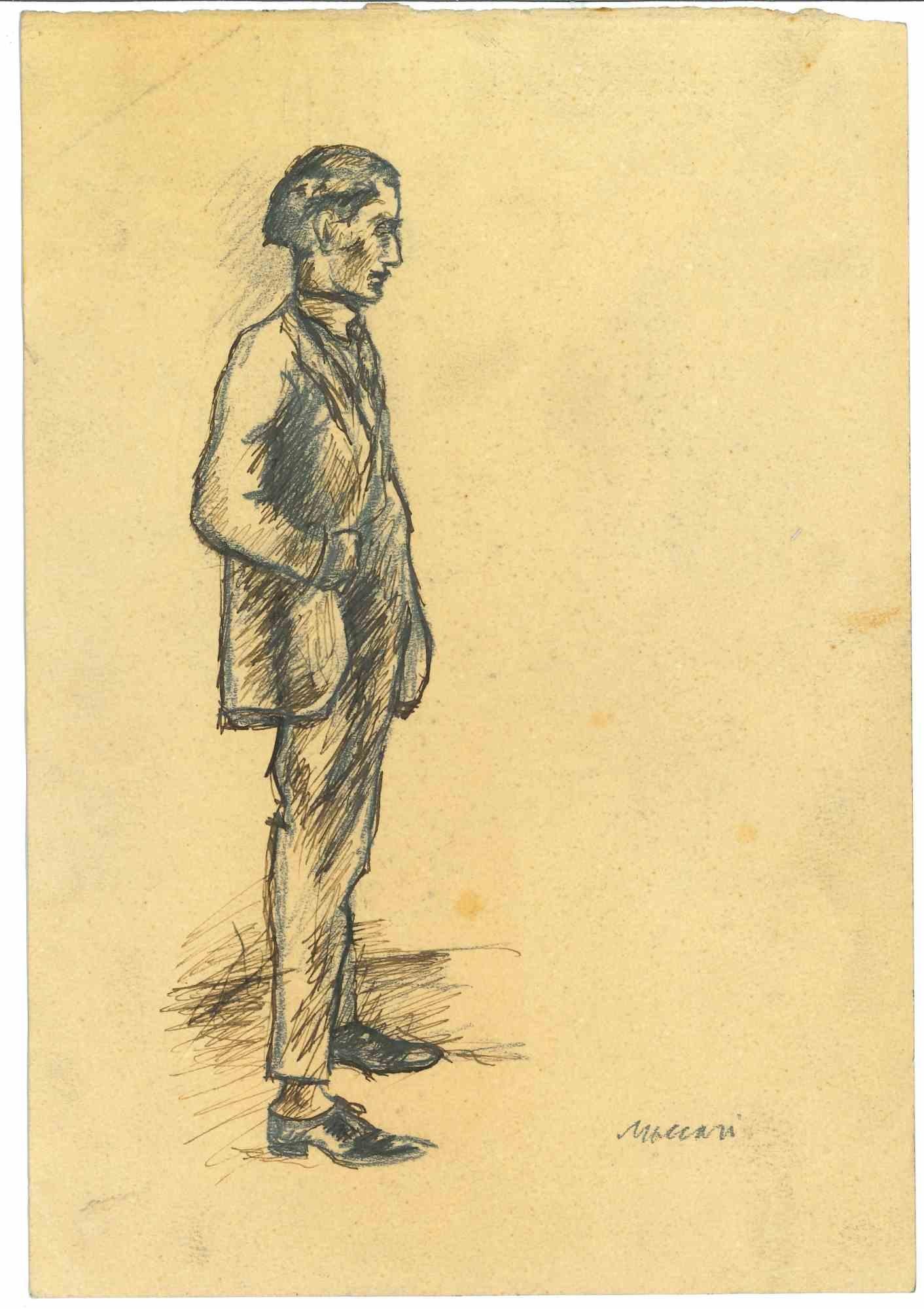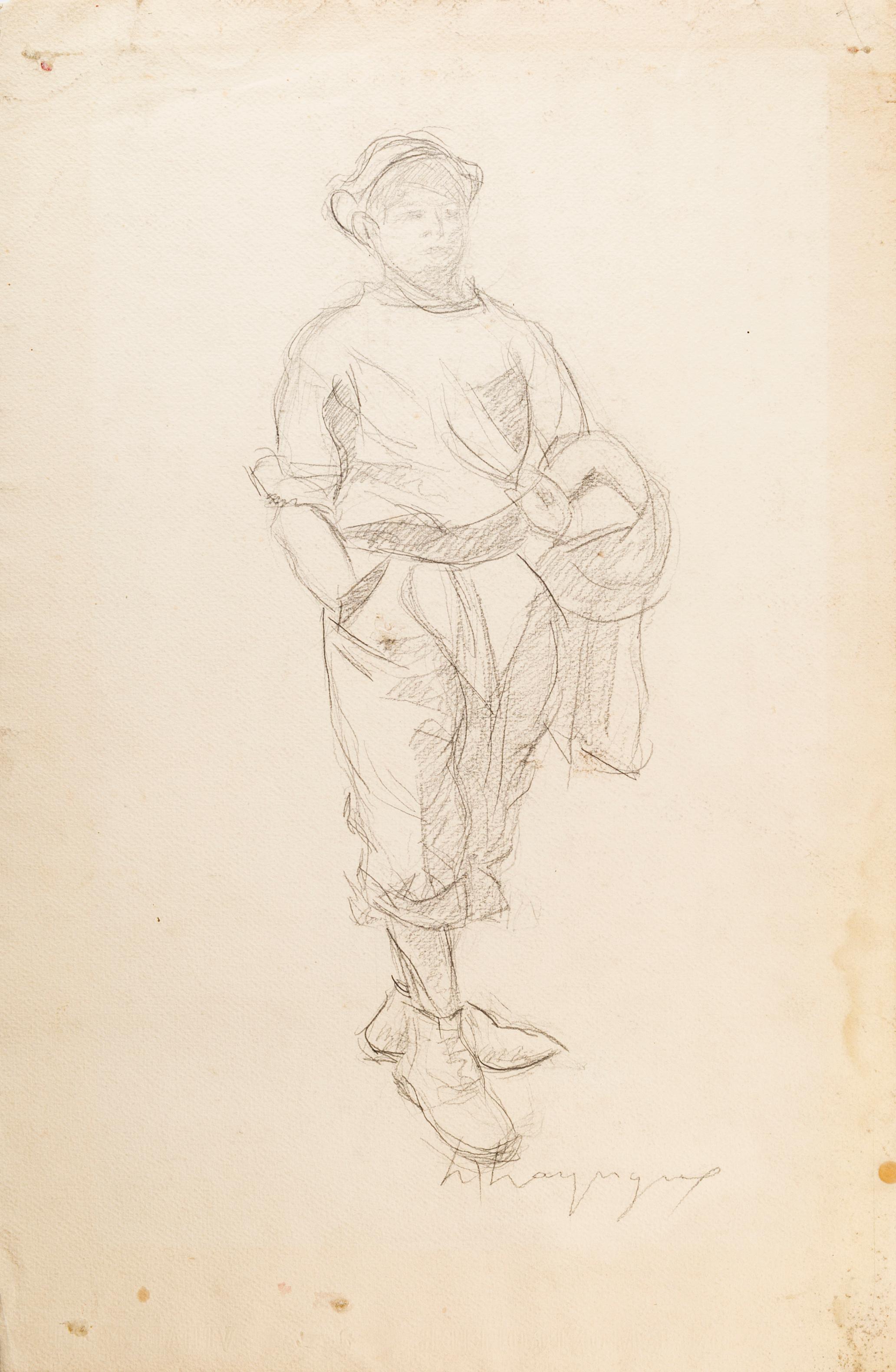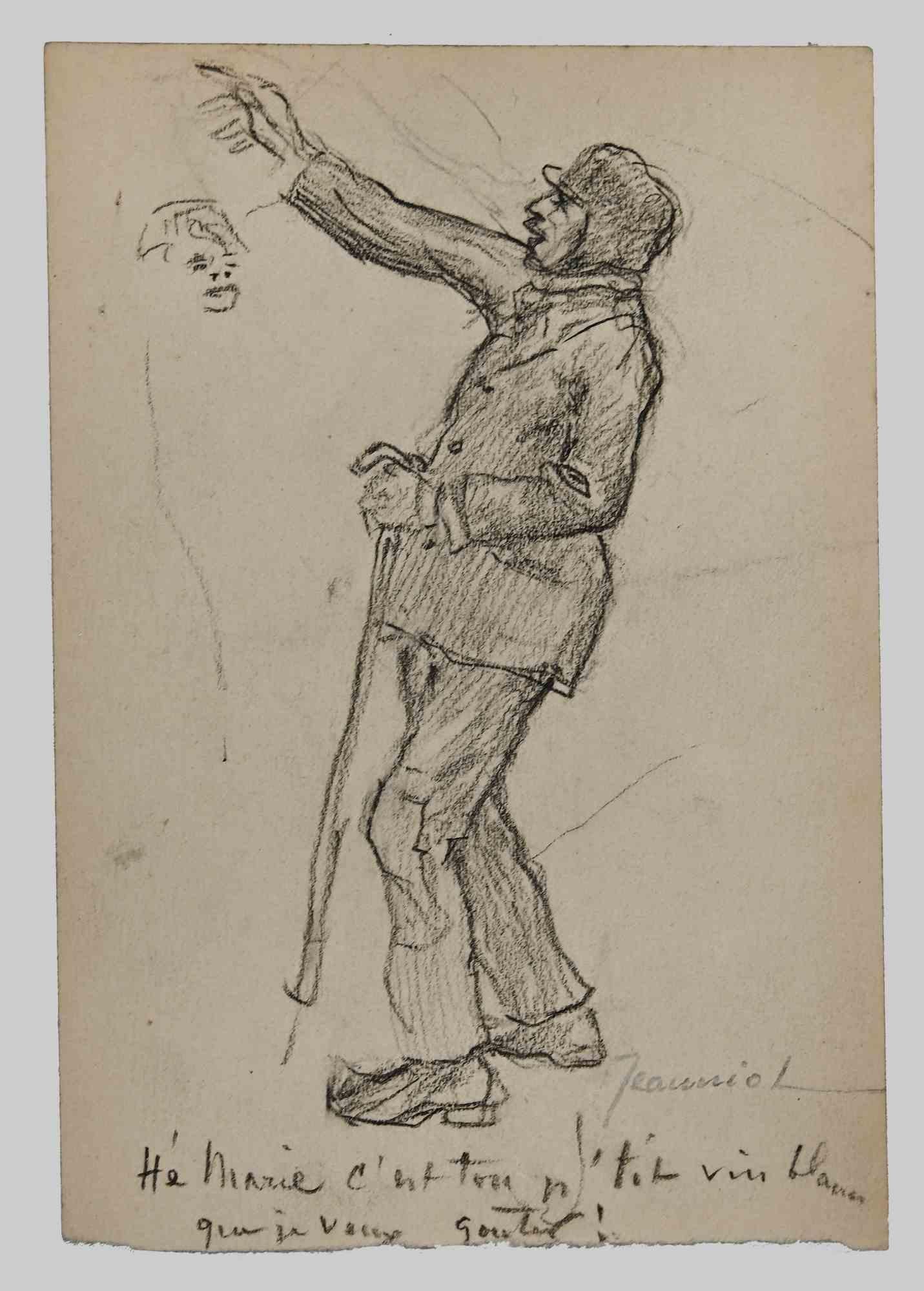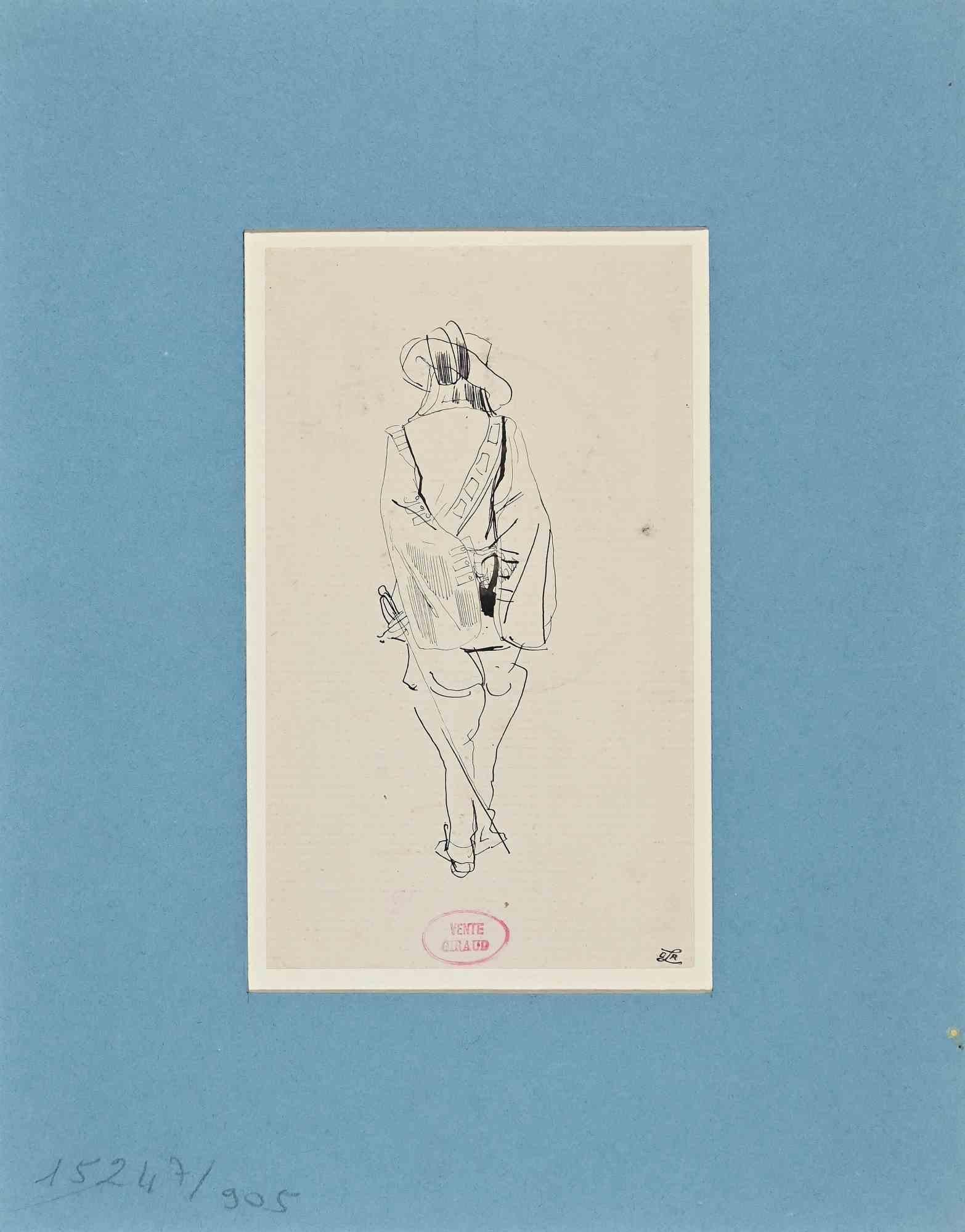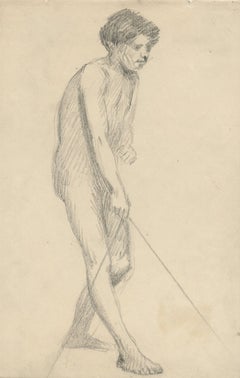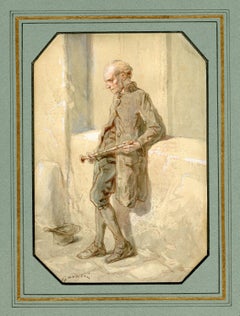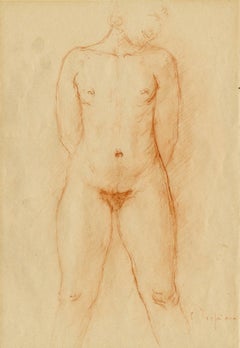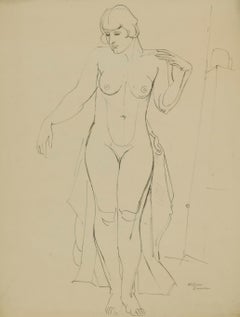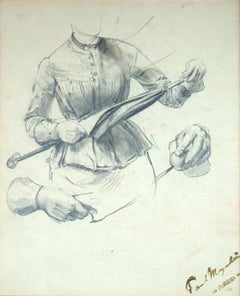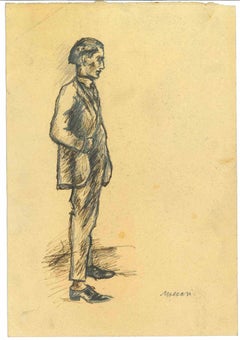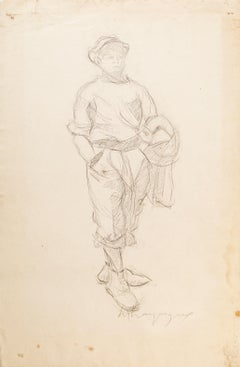Items Similar to Untitled (Standing man with umbrella behind)
Want more images or videos?
Request additional images or videos from the seller
1 of 5
Charles MaurinUntitled (Standing man with umbrella behind)c. 1890
c. 1890
$750
£572.96
€658.20
CA$1,073.80
A$1,174.62
CHF 611.99
MX$14,133.26
NOK 7,750.04
SEK 7,276.54
DKK 4,915.13
About the Item
Untitled (Standing man with umbrella behind)
Graphite on paper, c. 1890's
Unsigned
Provenance: Estate of the Artist
Lucien Goldschmidt (1912-1992), noted art
dealer and scholar on Maurin
From the artist's sketchbook/record book, with the typeface number "561"
Image size: 7 7/8 x 6 1/4 inches
Condition: Good, tipped to support sheet
Charles Maurin
le puy-en-velay 1856 - grasse 1914
Biography
Having won the art scholarship known as the Prix Crozatier in 1875, Charles Maurin entered the Ecole des Beaux-Arts in Paris, studying with Jules Lefèbvre and Gustave Boulanger, and with Rodolphe Julian at the Académie Julian. He first exhibited at the Salon des Artistes Français in 1882, where he showed a pair of portraits, one of which gained an honourable mention. He continued to exhibit at the Salon des Artistes Français until 1890. He participated in the Salon des Indépendants for the first time in 1887, showing a number of paintings, drawings and engravings that were admired by, among others, Edgar Degas. As an artist, he worked in a variety of styles, the most distinctive being a sort of Symbolism evident in a range of allegorical subjects that he treated.
Maurin had a lifelong interest in the depiction of the female nude, and, like Degas and Mary Cassatt, was fond of portraying women at intimate moments of their daily routine. He also produced a handful of splendid portraits, mainly in the 1880s and 1890s, of friends, patrons and fellow artists including Georges Seurat and Rupert Carabin, as well as drawings and pastels of café, theatre and street scenes. Around 1885 he took up an appointment as a professor at the Académie Julian, where he met Félix Vallotton, who became a close friend. Another good friend was Henri de Toulouse-Lautrec, with whom Maurin shared an exhibition in 1893 at the Galerie Boussod et Valadon in Paris. It was there that, at the urging of Degas, the collector Henry Laurent began to acquire Maurin’s work, eventually becoming his foremost patron and collector.
The 1890s found Maurin enjoying a moderately successful career, with one-man shows with Ambroise Vollard in 1895 and at Edmond Sagot in 1899. He received a commission from the State for a painting of Maternité (Motherhood); completed in 1893 and sent to the museum in his native town of Le Puy, the painting was soon regarded as one of the artist’s finest works. The previous year he took part in the inaugural Salon de la Rose + Croix, where he showed one of his largest and most important paintings; a monumental triptych entitled L’Aurore (Dawn). He also contributed works to the Salons de la Rose + Croix of 1895 and 1897. Maurin painted a series of large decorative panels of Tragedy, Dance and Music for the foyer of the municipal theatre in Le Puy in 1893, and for Sarah Bernhardt designed sets and costumes for Edmond Rostand’s La Princess Lointaine in 1895. He visited Holland, Belgium and England, and sent works to Le Libre Esthétique in Brussels in 1896 and 1897, and the Exhibition of International Art in London in 1898. A man of firm anarchist leanings, Maurin produced illustrations for the radical journal Le Temps nouveau, and published portrait prints of the French anarchists Louise Michel and François Koenigstein, known as Ravachol. In 1895 he was also commissioned to provide illustrations for the art and literary journal La Revue Blanche.
After 1900, however, Maurin’s output declined considerably, partly due to ill health, and the last years of his life were spent in Brittany and Provence, where he died in obscurity in 1914. His work was largely forgotten after his death, although a retrospective exhibition was held at the Galerie Bernheim-Jeune in Paris in 1921, while a monograph on his work by Ulysse Rouchon was published the following year. Although a significant collection of Maurin’s work is today in the collection of the Musée Crozatier in Le Puy-en-Velay, his paintings and drawings remain little represented in museums outside France.
As a draughtsman, Charles Maurin was equally adept in pastel, chalk and pencil, and was highly regarded by critics, collectors and fellow artists; his drawings were, for example, particularly esteemed by Degas, who compared his draughtsmanship to that of his own great hero, Ingres. An innovative artist, he invented a method of using an atomizer to spray pigment onto the surface of the paper to create what he termed ‘peintures au vaporisateur’; large, atmospheric watercolour landscapes of great subtlety and beauty. Maurin is perhaps best known today, however, as a gifted and prolific printmaker, and played an important role in the revival of colour etching and wood engraving in the 1890s. Like his paintings, many of his prints focus on the female nude, or the theme of mothers and children, and account for some of the artist’s most striking and individual works. Maurin also developed a number of new techniques and processes, particularly with regard to printing in colour. Some of his prints were published in editions of ten or less, however, and much of his graphic work remains very rare today.
Although long forgotten or ignored after his death, Charles Maurin’s eclectic oeuvre as a painter, printmaker and draughtsman remains one of the most distinctive of any artist in France in the late 19th century. The French scholar Jacques Foucart, writing in 1979, succinctly described the artist as ‘that curious and libertarian figure, so typical of the effervescent Paris of the Belle Epoque, an engraver of social customs comparable with Louis Legrand, a perfectionist and an inventive technician, a sensitive draughtsman à la Besnard, a friend of Lautrec and Valloton. He created some of the most extravagant humanitarian and ‘socialist’ visions of the fin-de-siècle, which he treated in a flexible and decorative ‘graphisme’ in the manner of Eugène Grasset, or even of De Feure...That an artist of such intriguing qualities – even though, as engraver of nudes, he does at times become rather tiresomely vulgar and commercial – and so representative of a period that was hungry to explore everything (it is often said that all modern art was contained in the years before 1914), has been the subject of neither an exhibition, since that of 1921 at Bernheim’s, nor of a monograph, certainly sets one thinking about the vagaries of Taste and about the nature of the present fashion for the art of 1900.’ In recent years, however, a revival of interest in Maurin’s remarkable body of work culminated in a major monographic exhibition, entitled Charles Maurin, un Symboliste du Réel, at the Musée Crozatier in the artist’s native town of Le Puy-en-Valey in 2006.
Courtesy Stephen Ongpin, London
- Creator:Charles Maurin (1856 - 1914, French)
- Creation Year:c. 1890
- Dimensions:Height: 7.88 in (20.02 cm)Width: 6.25 in (15.88 cm)
- Medium:
- Movement & Style:
- Period:
- Condition:
- Gallery Location:Fairlawn, OH
- Reference Number:Seller: FA122631stDibs: LU14016413012
About the Seller
5.0
Recognized Seller
These prestigious sellers are industry leaders and represent the highest echelon for item quality and design.
Platinum Seller
Premium sellers with a 4.7+ rating and 24-hour response times
Established in 1978
1stDibs seller since 2013
815 sales on 1stDibs
Typical response time: <1 hour
Associations
International Fine Print Dealers Association
- ShippingRetrieving quote...Shipping from: Akron, OH
- Return Policy
Authenticity Guarantee
In the unlikely event there’s an issue with an item’s authenticity, contact us within 1 year for a full refund. DetailsMoney-Back Guarantee
If your item is not as described, is damaged in transit, or does not arrive, contact us within 7 days for a full refund. Details24-Hour Cancellation
You have a 24-hour grace period in which to reconsider your purchase, with no questions asked.Vetted Professional Sellers
Our world-class sellers must adhere to strict standards for service and quality, maintaining the integrity of our listings.Price-Match Guarantee
If you find that a seller listed the same item for a lower price elsewhere, we’ll match it.Trusted Global Delivery
Our best-in-class carrier network provides specialized shipping options worldwide, including custom delivery.More From This Seller
View AllStanding Male Nude
By Frank Duveneck
Located in Fairlawn, OH
Standing Male Nude
Graphite on wove paper, c. 1890's
Unsigned
Sheet size: 9 5/16 x 6 inches
Provenance:
Rookwood Pottery Factory Collection, Cincinnati
Ira Spanierman, New York (labe...
Category
1890s Nude Drawings and Watercolors
Materials
Graphite
Untitled (Musician with clarinet)
By Paul Gavarni (Guillaume Sulpice Chevalier)
Located in Fairlawn, OH
Untitled (Musician with clarinet)
Watercolor on paper, c. 1844
Created on J Whatman Turkey Mill Watermarked paper
Signed lower left: Gavarni (see photo)
Condition: very fresh colors
...
Category
1840s Romantic Figurative Drawings and Watercolors
Materials
Watercolor
Nu (Standing Female Nude)
By Charles Despiau
Located in Fairlawn, OH
Nu (Standing Female Nude)
Red chalk on wove paper, c. 1925
Signed lower right by the artist, see photo
Condition: Excellent
Image/Sheet size: 12 1/8 x 8 5/16 inches
Note:
Despiau ...
Category
1920s French School Nude Drawings and Watercolors
Materials
Chalk
Standing Female Nude
By William Sommer
Located in Fairlawn, OH
Standing Female Nude
Match stick and ink drawing, c. 1925
Signed with the estate stamp B
Sheet size: 21 x 16 inches
Created at the Kakoon Arts Klu...
Category
1920s American Modern Nude Drawings and Watercolors
Materials
Ink
Untitled (Young woman seen from the back)
By Paul César Helleu
Located in Fairlawn, OH
Untitled (Young woman seen from the back)
Sanguine crayon, charcola and watercolor on paper, c. 1910
Signed with the estate stamp, Lugt 5169 lower left corner
Provenance:
Estate of ...
Category
Early 1900s Impressionist Figurative Drawings and Watercolors
Materials
Charcoal
Standing Male Nude (recto) Study of the Head of the Standing Male Nude (verso)
By William Merritt Chase
Located in Fairlawn, OH
Standing Male Nude (recto)
Study of the Head of the Standing Male Nude (verso)
Unsigned
Provenance:
Estate of the artist
Helen Chase Storm (the artist's daughter)
Jackson Chase Storm (the artist's grandson)
Baker-Pisano Collection (the author of the William Merritt Chase Catalog Raisonne Project)
References And Exhibitions:
Pisano D8, reproduced p. 183
Rare. Chase did relatively few drawings, probably no more than 150 in total, according to the catalogue raisonne.
William Merritt Chase (1840-2016)
Born in Nineveh, Indiana Died New York, New York
In 1883 Chase was involved in the organization of an exhibition to help raise funds for a pedestal for the Statute of Liberty...
Category
1870s American Impressionist Nude Drawings and Watercolors
Materials
Graphite
You May Also Like
Woman with Umbrella - Charcoal Drawing on Paper by A. Mérodack-Jeanneau
By Alexis Mérodack-Jeanneau
Located in Roma, IT
Woman with Umbrella is an original drawing on ivory paper realized by Alexis Mérodack-Jeanneau in the early 20th century.
Stamp of the artist's at...
Category
Late 19th Century Figurative Drawings and Watercolors
Materials
Charcoal
Study with Torso, Hands, and Umbrella - The characteristic of the inconspicuous
Located in Berlin, DE
Paul Friedrich Meyerheim (1842 Berlin - 1915 ibid.). Sketch of a female torso with hands and an umbrella. Pencil on paper, 27.5 x 22.5 cm (visible size)...
Category
1890s Realist Figurative Drawings and Watercolors
Materials
Pencil
The Standing Man - Drawing by Mino Maccari - 1950s
By Mino Maccari
Located in Roma, IT
The Standing Man is an original Drawing in pencil on creamy-colored paper realized by Mino Maccari in mid 20th century.
Hand-signed on the lower in pencil.
Good conditions with som...
Category
1950s Modern Figurative Drawings and Watercolors
Materials
Carbon Pencil
Walking Man - Original Drawing - Mid 20th Century
Located in Roma, IT
Walking Man is an original drawing realized during the half of the 20th Century by an anonymous artist.
The artwork represents a pensive man as he walks with his hands in his pocket...
Category
Mid-20th Century Figurative Drawings and Watercolors
Materials
Pencil
Figure - Original Drawing By Pierre Georges Jeanniot - Early 20th Century
By Pierre Georges Jeanniot
Located in Roma, IT
Figure is an original Drawing on paper realized by the painter Pierre Georges Jeanniot (1848-1934).
Drawing in Pencil.
Hand-signed on the lower.
Good conditions except for aged ma...
Category
Early 20th Century Modern Figurative Drawings and Watercolors
Materials
Pencil
Musketeer from Behind- Drawing on Paper by E. Giraud - Late 19th Century
By Eugène Giraud
Located in Roma, IT
Musketeer from Behind is an Original Drawing in China Ink and watercolor realized by Eugène Giraud in the Late 19th Century.
Good conditions.
The delicate and beautiful fine stroke...
Category
Late 19th Century Modern Figurative Drawings and Watercolors
Materials
Paper, Ink
More Ways To Browse
Man Standing
Antique Reel
Umbrella Paintings
19th Century French Female Portraits
19th Century Figurative Paintings Dance
Jules Lefebvre
Felix Vallotton
Nude Mother
La Revue Blanche
Edmond Rostand
Antique Atomizers
Man With Umbrella
Raymond Massey
S Grunvald
Tide Figure
Vintage Las Vegas Showgirls
Watercolour Antique Pre 1900 Paintings
Zero Mostel
